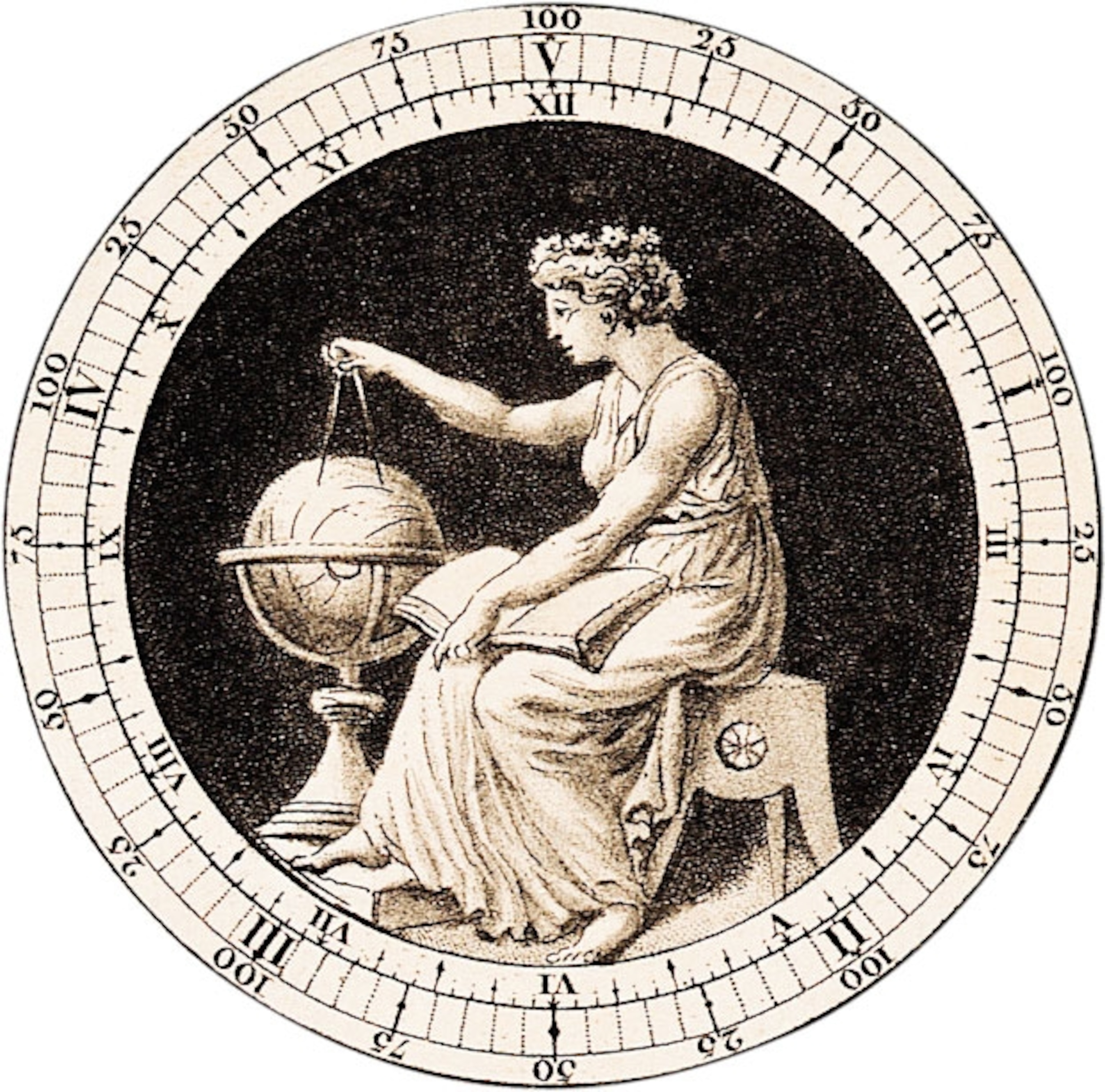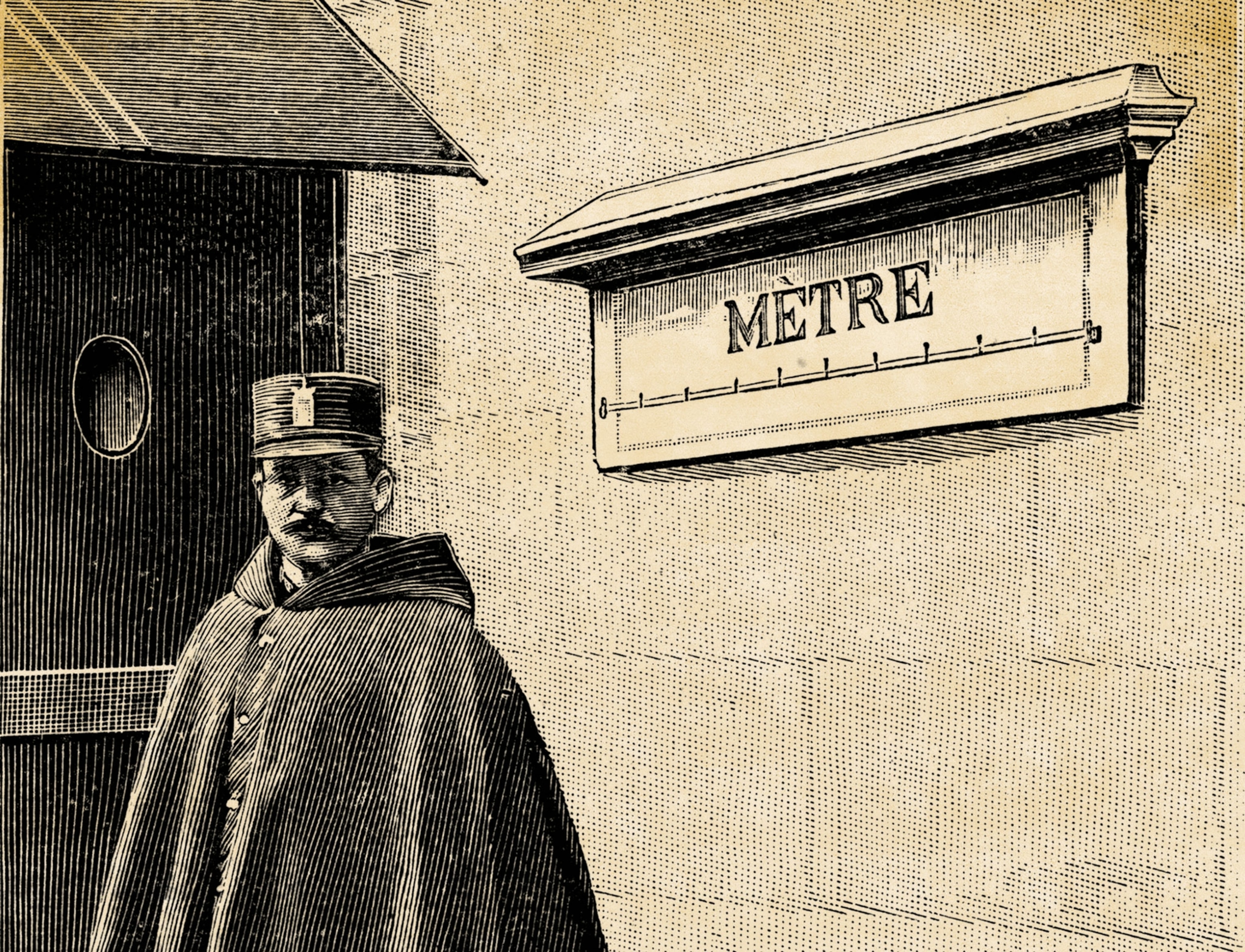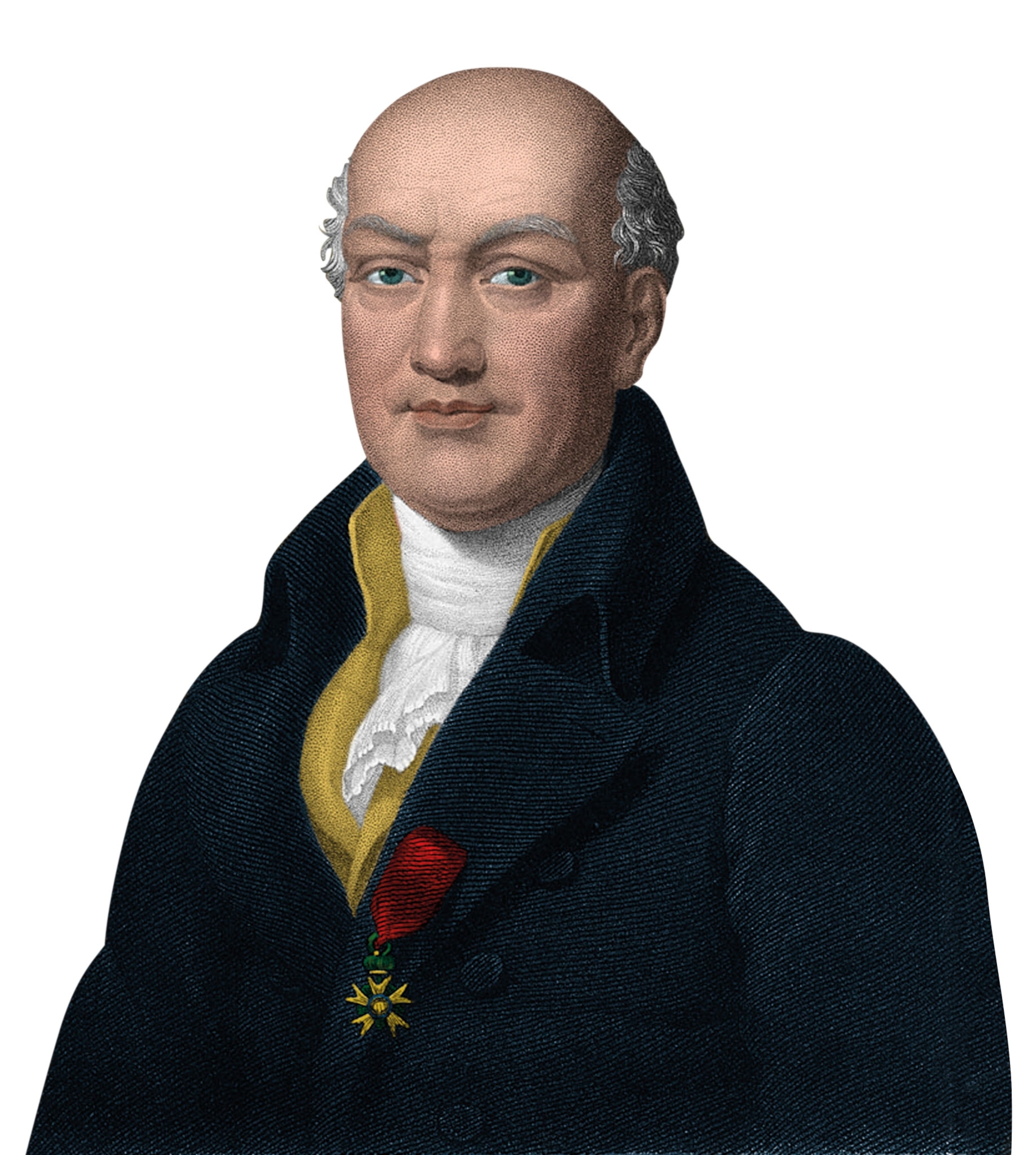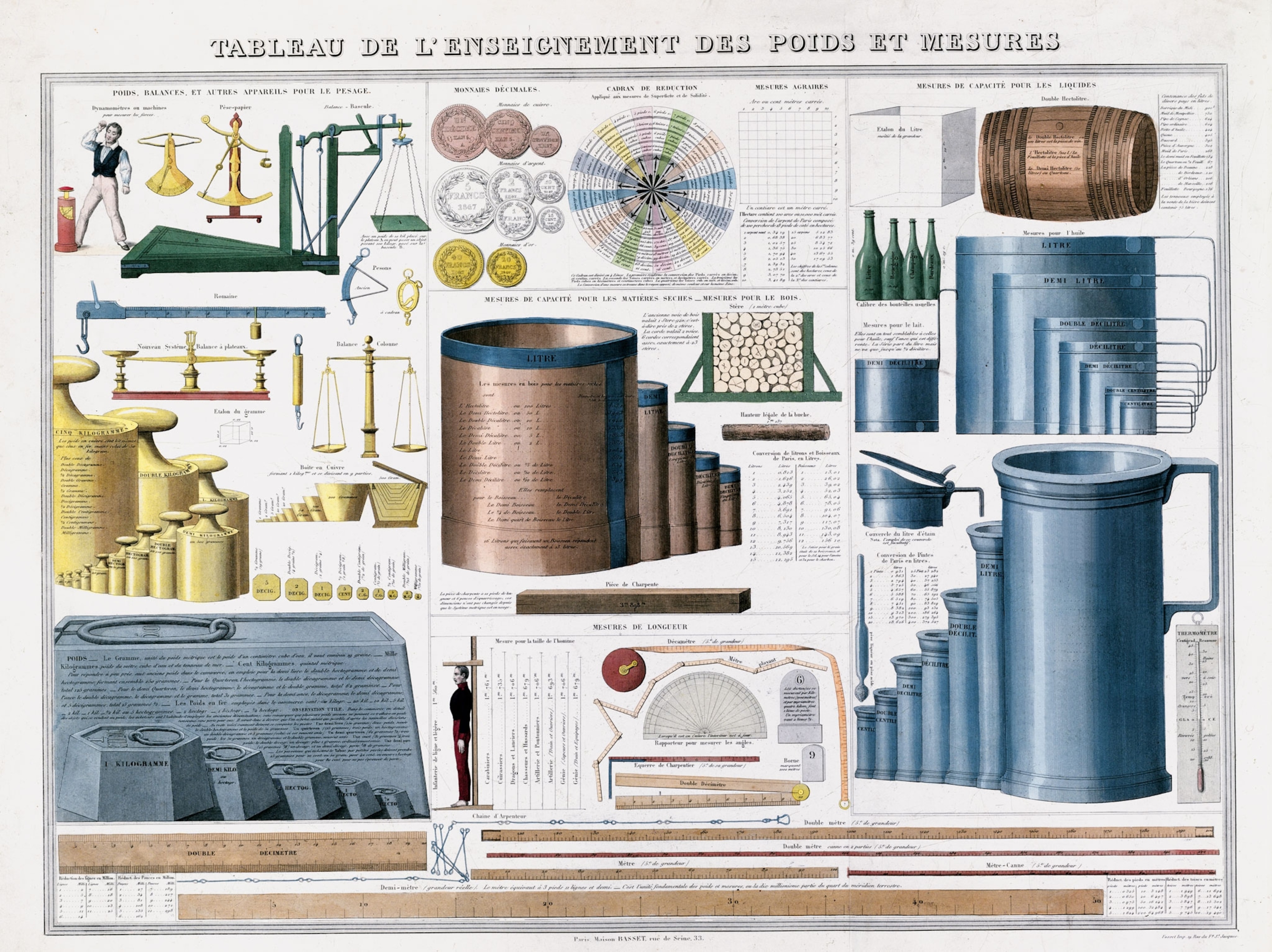The French Revolution not only toppled a king—it also forged the metric system
As revolution raged in the 1790s, French scientists replaced a chaotic system of weights and measures with an unified way to calibrate and calculate.

Mathematician and author, the Marquis de Condorcet (1743-1794) was an aristocrat who nevertheless embraced the early stage of the French Revolution. Even as the Jacobins hunted him down during the Reign of Terror—he was a moderate and opposed putting King Louis XVI to death—he wrote the Sketch for a Historical Picture of the Progress of the Human Mind, expressing his faith in a future guided by science and reason. Two days after his arrest, he killed himself in prison rather than face execution.
Condorcet’s ideals live on, however, in the way most of the world measures things: the metric system. He believed a universal and standard system would allow people to calculate their own best interests, “without which they cannot be really equal in rights . . . nor really free.”

Order from chaos
At the time of the French Revolution in 1789, Paris was the global capital of science, whose leading lights, the savants (wise ones), made lasting contributions to physics, chemistry, and biology. (A century earlier, France was also the dueling capital of Europe.)
The early stages of the revolution famously abolished the last vestiges of feudalism in France. It also ended the right of the nobility to control the weights and measures used in their fiefdoms.
As elsewhere in Europe, the old weights and measures originated in a system used by the Romans. Over the centuries since Rome’s fall, it had broken down into myriad local systems across France. The savants faced reforming a patchwork of up to 800 different units of measurement, from the toise to the lieue and the quart to the pinte. Some measures were extremely basic: In early 18th-century Bordeaux, a unit of land was defined by how far a man’s voice carried. There was little or no standardization: In Paris, a pinte was the equivalent of 0.93 liters; in Saint-Denis, it was 1.46. An aune, used to measure cloth, was based on the width of local looms. It was little wonder that this chaotic system was prone to fraud and stifled domestic and foreign trade.
Marking time

French revolutionaries not only reformed their government; they also remade their calendars. In October 1793 they replaced the Gregorian calendar with their republican calendar (which would stay in use until late 1805). The old months were replaced by ones with names to describe the natural phenomenon from that time of year: A period between avril (April) and mai (May) became “Floréal” for blooming flowers. “Vendémiaire” was the autumnal month of vintage, when grapes were harvested for wine.
An early proposal was to impose the Parisian measures on the rest of the nation. But for the savants, this approach seemed an arbitrary, unscientific baseline. The diplomat Charles-Maurice de Talleyrand-Périgord then proposed that an unchanging standard should provide the basic unit of measurement, which he hoped would be adopted by other nations and harmonize international trade. The National Assembly agreed and asked the Academy of Sciences, led by Condorcet, to form a commission to select a new basic unit of measurement. The republican government promised the people of France “one law, one weight, and one measure,” a goal that would take 10 years to be approved and even longer to be accepted.
New from old
The savants eventually agreed that the various units of length, mass, and volume of the new system would all relate to each other. Each one could be divided and multiplied using a decimal scale.

This idea was, in itself, nothing new: Decimal-based systems had been used by the Romans, Indians, and Arabs. From the 14th century, economic and technical advances had made quantification more important, which led to using decimals for fractions, an idea put forward by the Flemish mathematician Simon Stevin. Nor was the concept of a universal measurement new, as it had already been proposed by Englishman John Wilkins in 1668. Wilkins proposed using a tiny section of the Earth’s circumference as a standard for measuring lengths.
The commission settled on a short list of units, the most basic of which—in the category of distance—was the mètre, or meter (from the Greek word metron for “measure”). In 1790 the National Assembly and Louis XVI approved the new system. (Who was the prisoner in the iron mask, locked away by Louis XVI?)
Meet the meter

In order to accustom the public to the new meter, the French government distributed leaflets, posters, and conversion tables. After 1796, engraved marble meter bars were installed in public places around Paris. Two are still in place today, but only one in its original location: 36 rue de Vaugirard, in front of the Palace of Luxembourg. In 1799 France’s premier instrument maker, Étienne Lenoir, made the definitive meter in platinum, replacing a provisional standard made from copper. It remained in use as the definitive metric standard until replaced in 1878.
How long is a meter?
The challenge to define the meter’s length, was taken up by a group of distinguished scientists: Jean-Charles de Borda, Joseph-Louis Lagrange, Gaspard Monge, Pierre-Simon Laplace, and Condorcet.
After some discussion, the group adapted an idea proposed by Wilkins a century before—one meter would equal one ten-millionth of the distance from the North Pole to the Equator. The distance would be calibrated by measuring the meridian arc that runs from Dunkirk, on France’s northern coast, via Paris, to Barcelona on Spain’s Mediterranean coast. Borda’s invention of the repeating circle, a surveying instrument more accurate than a conventional quadrant, made this option more desirable.

In 1792 astronomers Jean-Baptiste Delambre and Pierre Méchain began their measurements of the meridian. Chemist Antoine-Laurent Lavoisier called the journey “the most important mission that any man has ever been charged with.” After several years of work, they delivered their calculations (recent satellite surveys have affirmed their values were off, but not by very much).
Selling the system
By 1795 the savants had used this measurement as the foundation of a completely new system: The meter would be used for length, the gram for mass, and the liter for volume. The metric system was officially adopted in France on December 10, 1799. Government proclamation was one thing, but practical use was another. Many people preferred their old customs of measurement. Also, in computing prices of goods in the new way, sellers rounded up to their advantage, further damaging the reputation of the new system with the general public. (The kilogram is no longer based on a metal cylinder in France. Here's what replaced it.)
Napoleon Bonaparte, who took power in France in 1799, was ambivalent about the metric system, dismissing it as “tormenting the people with trivia.” In 1812, as trading continued in the old units, he introduced the so-called mesures usuelles (customary measures), a compromise between the metric system and the traditional system. He lengthened, for example, the traditional toise by some 20 inches to make the new toise usuelle equal to two meters in the new metric system.
After Napoleon fell from power in spring 1814, the mesures usuelles technically remained in place, but the traditional measures from before the revolution came back into use. Meanwhile, though resisted in the land of its invention, the metric system gained adherents in other countries. By 1820 William I of Orange had declared the metric system official in the Netherlands, and when Belgium separated from the Netherlands 10 years later, it kept the new system of measurement. Luxembourg had also made the switch to metric.

In 1837, eager to co-opt the legacy of the revolution for his regime, the new king of France, Louis Philippe I, revoked the use of both the traditional measurements and the mesures usuelles and re-instated the metric system as part of a drive toward modernization. (Here's why different countries drive on different sides of the road.)
Ultimately, it was not laws that would establish the meter as the standard measure across the world but the spread of education, science, transportation, and commerce. Today, two centuries after it was first implemented, only three countries have officially retained a non-metric system: Myanmar, Liberia, and the United States.